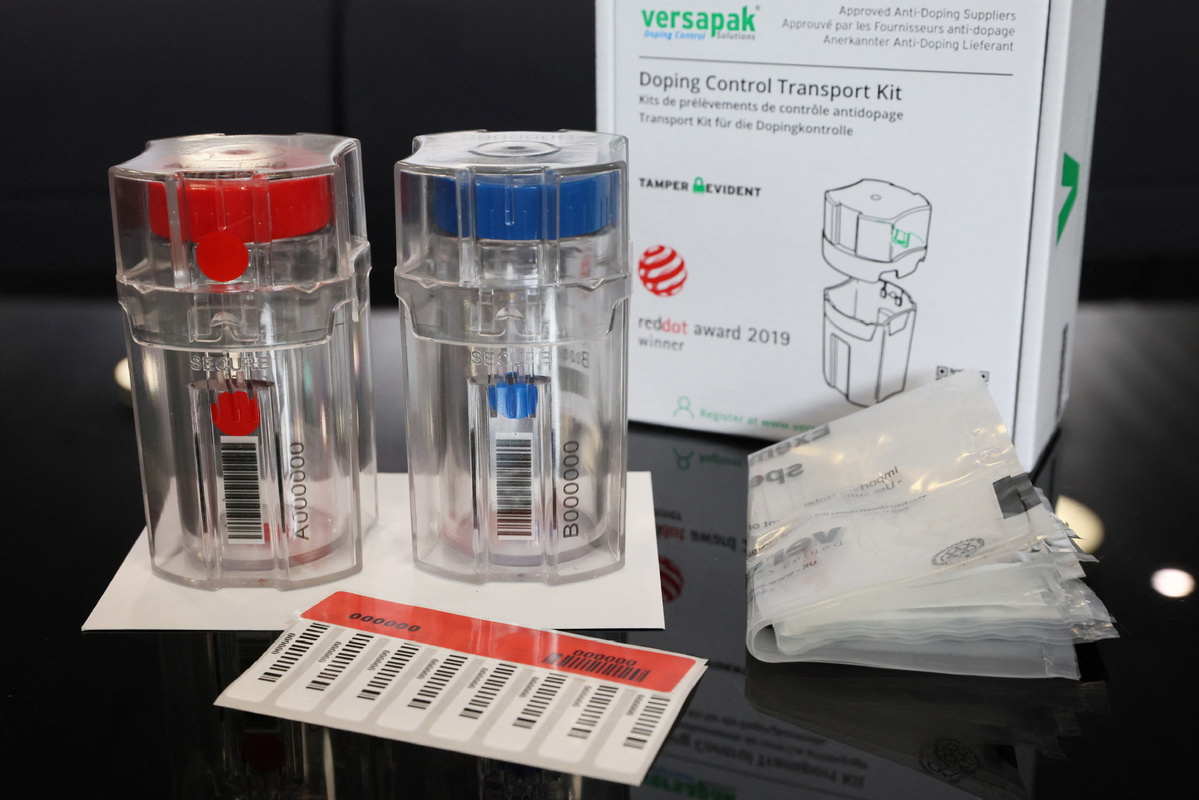美国应停止诋毁中国游泳运动员 - 2024-07-25

A doping control transport kit of Versapak, including A and B samples, is displayed during the World Anti-Doping Agency (WADA) Symposium in Lausanne, Switzerland, June 11, 2022.
Days before the Olympic torch is lit in Paris, swimmers from many nations almost participated in a test race.
On the July 23, FINA released the results of their rigorous pre-Olympic doping tests on athletes. The Chinese swimming team underwent the most thorough testing, averaging 21 tests per person over a span of more than six months. In stark contrast, during the same period, the average number of doping tests for 46 American swimmers was only 6 times.
This glaring discrepancy has left many Chinese sports supporters feeling uneasy and offended. Despite Chinese athletes adhering to strict regulations, some US swimmers and politicians persist in calling for investigations into the World Anti-Doping Agency's handling of a Chinese "doping case".
It is understandable for concerns about doping to arise in a sports powerhouse like the US, which has had its share of doping scandals, including eight Olympic medals being stripped due to doping violations, and athletes being caught and suspended for using performance-enhancing drugs in football and basketball matches.
However, the arguments put forth by some US swimmers and congressmen to tarnish Chinese swimmers lack substance. Reports from April, including those from the New York Times, revealed that 23 Chinese swimmers had tested positive for the banned substance trimetazidine (TMZ) seven months before the 2021 Tokyo Olympics. Investigations later revealed that the swimmers had unknowingly ingested the substance through food consumed at a hotel in Shijiazhuang, Hebei province. The WADA accepted these findings after thorough procedures.
It is crucial to distinguish between inadvertent consumption of a substance months before a competition and deliberate doping during a race.
A US swimming gold medalist emphasized the importance of transparency, a sentiment shared by Chinese athletes and sports fans. Chinese sports enthusiasts support their athletes in winning and training fairly, as doping has no place in sports.
However, these US swimmers and congress members must also clarify their intentions. What do they seek to achieve before the Olympics commence? Are they aiming to tarnish the image of Chinese swimmers before any races take place? Is their goal to engage in psychological warfare to gain an advantage in the swimming events? Such actions do not align with the spirit of the Olympics. If they can freely question WADA's decisions, their motives may also come under scrutiny.
The Olympics should be a global celebration of sports that is equitable and just. It should not serve as a platform for certain US swimmers and politicians to engage in blatant bullying and intimidation.
The author is Yan Lun, a writer for China Daily.
Source: China Daily
On the July 23, FINA released the results of their rigorous pre-Olympic doping tests on athletes. The Chinese swimming team underwent the most thorough testing, averaging 21 tests per person over a span of more than six months. In stark contrast, during the same period, the average number of doping tests for 46 American swimmers was only 6 times.
This glaring discrepancy has left many Chinese sports supporters feeling uneasy and offended. Despite Chinese athletes adhering to strict regulations, some US swimmers and politicians persist in calling for investigations into the World Anti-Doping Agency's handling of a Chinese "doping case".
It is understandable for concerns about doping to arise in a sports powerhouse like the US, which has had its share of doping scandals, including eight Olympic medals being stripped due to doping violations, and athletes being caught and suspended for using performance-enhancing drugs in football and basketball matches.
However, the arguments put forth by some US swimmers and congressmen to tarnish Chinese swimmers lack substance. Reports from April, including those from the New York Times, revealed that 23 Chinese swimmers had tested positive for the banned substance trimetazidine (TMZ) seven months before the 2021 Tokyo Olympics. Investigations later revealed that the swimmers had unknowingly ingested the substance through food consumed at a hotel in Shijiazhuang, Hebei province. The WADA accepted these findings after thorough procedures.
It is crucial to distinguish between inadvertent consumption of a substance months before a competition and deliberate doping during a race.
A US swimming gold medalist emphasized the importance of transparency, a sentiment shared by Chinese athletes and sports fans. Chinese sports enthusiasts support their athletes in winning and training fairly, as doping has no place in sports.
However, these US swimmers and congress members must also clarify their intentions. What do they seek to achieve before the Olympics commence? Are they aiming to tarnish the image of Chinese swimmers before any races take place? Is their goal to engage in psychological warfare to gain an advantage in the swimming events? Such actions do not align with the spirit of the Olympics. If they can freely question WADA's decisions, their motives may also come under scrutiny.
The Olympics should be a global celebration of sports that is equitable and just. It should not serve as a platform for certain US swimmers and politicians to engage in blatant bullying and intimidation.
The author is Yan Lun, a writer for China Daily.
Source: China Daily
